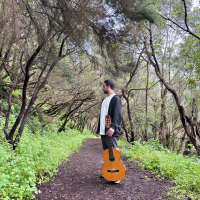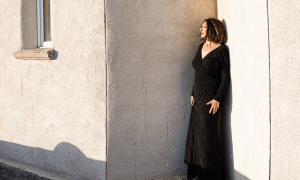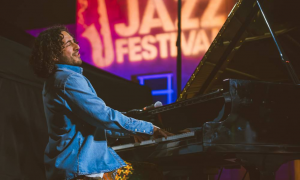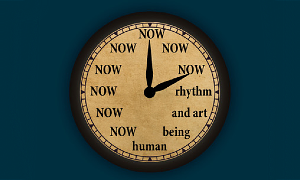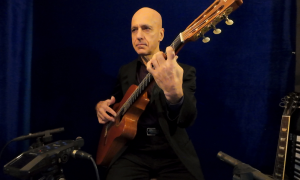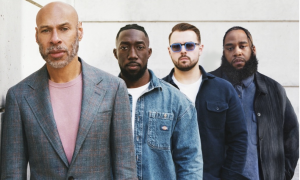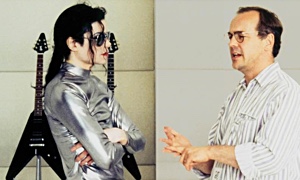New England Conservatory President Emeritus Laurence Lesser has been named Interim Chief Executive Officer of the Conservatory for the 2006-07 academic year (or until a new President can take office at an earlier date). The announcement, which takes effect immediately, was made Monday by Jack H. Vernon, Chair of the Board of Trustees.
Lesser, who served as President from 1983-1996 and who has been a member of the cello faculty since his arrival at NEC in 1974, will carry out the day-to-day executive duties with the support of a Trustee oversight group consisting of Vernon, Treasurer Norton Q. Sloan, and Life Trustee and Former Board Chair David W. Scudder. Currently the occupant of the Walter W. Naumburg Chair in Music, Lesser will continue his full schedule of teaching during the transition period occasioned by the death of President Daniel Steiner, June 11.
In the meantime, the Presidential Search Committee, chaired by Board Vice Chair Harold I. Pratt, is actively working with Heidrick & Struggles, an executive search firm, to identify NEC's next President.
During his 13-year tenure as President of NEC, Lesser presided over the restoration of NEC's renowned Jordan Hall and successfully completed a capital campaign of $30 million. He added numerous distinguished musicians to the faculty including violinists James Buswell, Lucy Chapman, and Michle Auclair; pianists Randall Hodgkinson, Irma Vallecillo, and Wha Kyung Byun; guitarist Eliot Fisk; flutist Paula Robison; clarinetist Richard Stoltzman; voice teacher Patricia Craig; jazz vocalist Dominique Eade; jazz bassist Cecil McBee; chamber music coach Scott Nickrenz; and returning opera conductor and director John Moriarty. In addition, the Borromeo String Quartet, the first chamber ensemble to be awarded an NEC Artist Diploma, became quartet-in-residence during Lesser's presidency. Lesser also created the popular First Monday Concert Series, which he continues to direct. Under his leadership, the Conservatory took over the music program at the Walnut Hill School for the Performing Arts in Natick, and acquired significant real estate, including the former Cotting School on St. Botolph Street and an office building on Huntington Ave. and Gainsborough St.
A much valued faculty member, Lesser was called on to serve in two interim leadership positions prior to his Presidency. In spring 1982, he was one of three faculty appointed to a transitional executive troika. Then, from July 1982 to March 1983, he served as Artistic Director. After completing the Jordan Hall restoration and capital campaign, he stepped down from the Presidency on December 31, 1996 in order to rededicate himself to performing and teaching, artistic imperatives that had been somewhat curtailed during his 13 years in office.
Born in Los Angeles, Lesser graduated from Harvard University in mathematics cum laude and Phi Beta Kappa, then traveled to Germany on a Fulbright Fellowship where he worked with cellist Gaspar Cassad. In 1963, he returned to Los Angeles and the University of Southern California where he studied with his longtime mentor Gregor Piatigorsky and became his teaching assistant. He subsequently taught on the faculties of USC and the Peabody Institute. He was a top prize winner in the 1966 International Tchaikovsky Competition in Moscow
Since leaving the top leadership position, Lesser has burnished his reputation as both performer and teacher. Earlier in his career, he had appeared as soloist with orchestras including the Boston Symphony, London Philharmonic, and New Japan Philharmonic and participated as a chamber musician in the historic Heifetz-Piatigorsky concerts and recordings. As his tenure came to an end, he took on more concert work, giving his first solo recital in 10 years in November 1996, with pianist Seymour Lipkin. This was followed by a 60th Birthday recital in 1998 and a recital of 20th Century music in 2000. Additionally, he has performed as soloist or chamber musician with the Busan (Korea) Music Festival, the Banff Centre, the Gregor Piatigorsky Seminar for Cellists at USC's Thornton School of Music, the Michigan State University Chamber Music Series, Brown University Orchestra, Cape Cod Chamber Music Festival, Boston Classical Orchestra, the Newton Symphony, the Gardner Museum, and, of course, on the First Monday series.
Profiled in a cover article ("The Ultimate Teacher") in the July/August 1997 edition of Strings Magazine and showcased in features on his teaching and practice techniques in the November 2001 and September 2005 issues of The Strad, Lesser is recognized as one of the world's most important cello teachers and chamber music coaches. In 2005, he was named Chevalier du Violoncelle by the Eva Janzer Memorial Cello Center at Indiana University for distinguished achievements and contributions to the world of cello playing and teaching.
Lesser's cello students have won numerous awards and concerto competitions and fill important seats in orchestras throughout the world. They include: Carter Brey, section leader of the New York Philharmonic; Mickey Katz, member of the cello section, Boston Symphony Orchestra; Andrs Daz, Naumburg Competition winner; Sharon Robinson of the Kalichstein-Laredo-Robinson Trio; David Hardy, section leader, National Symphony Orchestra; Min-Ji Kim, First Prize, 2002 Irving W. Klein Competition and First Prize 2003 Holland-America Music Society Competition; Denise Djokic, First Prize 1998 Klein Competition; Tao Ni, Second Prize, 2003 Klein Competition; and--the most recent--Ahrim Kim, winner, Hudson Valley Philharmonic Competition and Fourth Prize, 2006 Ima Hogg Competition.
Similarly, chamber ensembles Lesser has helped coach have gone on to win important international competitions. These include the Parker Quartet and the Jupiter Quartet.
Much in demand as a judge, Lesser has sat on the juries of the Paulo Competition in Helsinki, the Feuermann in Berlin, and the Leipzig Bach Cello Competition. In 1994, he was the first non-Russian or non-Soviet to chair the jury of the International Tchaikovsky Competition in Moscow.
ABOUT NEW ENGLAND CONSERVATORY
Recognized nationally and internationally as a leader among music schools, New England Conservatory offers rigorous training in an intimate, nurturing community to 750 undergraduate, graduate, and doctoral music students from around the world. Its faculty of 225 boasts internationally esteemed artist-teachers and scholars. Its alumni go on to fill orchestra chairs, concert hall stages, jazz clubs, recording studios, and arts management positions worldwide. Nearly half of the Boston Symphony Orchestra is composed of NEC trained musicians and faculty.
The oldest independent school of music in the United States, NEC was founded in 1867 by Eben Tourjee. Its curriculum is remarkable for its wide range of styles and traditions. On the college level, it features training in classical, jazz, Contemporary Improvisation, world and early music. Through its Preparatory School, School of Continuing Education, and Community Collaboration Programs, it provides training and performance opportunities for children, pre-college students, adults, and seniors. Through its outreach projects, it allows young musicians to engage with non-traditional audiences in schools, hospitals, and nursing homes--thereby bringing pleasure to new listeners and enlarging the universe for classical music and jazz.
NEC presents more than 600 free concerts each year, many of them in Jordan Hall, its world- renowned, 100-year old, beautifully restored concert hall. These programs range from solo recitals to chamber music to orchestral programs to jazz and opera scenes. Every year, NEC's opera studies department also presents two fully staged opera productions at the Cutler Majestic Theatre in Boston.
NEC is co-founder and educational partner of “From the Top," a weekly radio program that celebrates outstanding young classical musicians from the entire country. With its broadcast home in Jordan Hall, the show is now carried by National Public Radio and is heard on 250 stations throughout the United States.
Lesser, who served as President from 1983-1996 and who has been a member of the cello faculty since his arrival at NEC in 1974, will carry out the day-to-day executive duties with the support of a Trustee oversight group consisting of Vernon, Treasurer Norton Q. Sloan, and Life Trustee and Former Board Chair David W. Scudder. Currently the occupant of the Walter W. Naumburg Chair in Music, Lesser will continue his full schedule of teaching during the transition period occasioned by the death of President Daniel Steiner, June 11.
In the meantime, the Presidential Search Committee, chaired by Board Vice Chair Harold I. Pratt, is actively working with Heidrick & Struggles, an executive search firm, to identify NEC's next President.
During his 13-year tenure as President of NEC, Lesser presided over the restoration of NEC's renowned Jordan Hall and successfully completed a capital campaign of $30 million. He added numerous distinguished musicians to the faculty including violinists James Buswell, Lucy Chapman, and Michle Auclair; pianists Randall Hodgkinson, Irma Vallecillo, and Wha Kyung Byun; guitarist Eliot Fisk; flutist Paula Robison; clarinetist Richard Stoltzman; voice teacher Patricia Craig; jazz vocalist Dominique Eade; jazz bassist Cecil McBee; chamber music coach Scott Nickrenz; and returning opera conductor and director John Moriarty. In addition, the Borromeo String Quartet, the first chamber ensemble to be awarded an NEC Artist Diploma, became quartet-in-residence during Lesser's presidency. Lesser also created the popular First Monday Concert Series, which he continues to direct. Under his leadership, the Conservatory took over the music program at the Walnut Hill School for the Performing Arts in Natick, and acquired significant real estate, including the former Cotting School on St. Botolph Street and an office building on Huntington Ave. and Gainsborough St.
A much valued faculty member, Lesser was called on to serve in two interim leadership positions prior to his Presidency. In spring 1982, he was one of three faculty appointed to a transitional executive troika. Then, from July 1982 to March 1983, he served as Artistic Director. After completing the Jordan Hall restoration and capital campaign, he stepped down from the Presidency on December 31, 1996 in order to rededicate himself to performing and teaching, artistic imperatives that had been somewhat curtailed during his 13 years in office.
Born in Los Angeles, Lesser graduated from Harvard University in mathematics cum laude and Phi Beta Kappa, then traveled to Germany on a Fulbright Fellowship where he worked with cellist Gaspar Cassad. In 1963, he returned to Los Angeles and the University of Southern California where he studied with his longtime mentor Gregor Piatigorsky and became his teaching assistant. He subsequently taught on the faculties of USC and the Peabody Institute. He was a top prize winner in the 1966 International Tchaikovsky Competition in Moscow
Since leaving the top leadership position, Lesser has burnished his reputation as both performer and teacher. Earlier in his career, he had appeared as soloist with orchestras including the Boston Symphony, London Philharmonic, and New Japan Philharmonic and participated as a chamber musician in the historic Heifetz-Piatigorsky concerts and recordings. As his tenure came to an end, he took on more concert work, giving his first solo recital in 10 years in November 1996, with pianist Seymour Lipkin. This was followed by a 60th Birthday recital in 1998 and a recital of 20th Century music in 2000. Additionally, he has performed as soloist or chamber musician with the Busan (Korea) Music Festival, the Banff Centre, the Gregor Piatigorsky Seminar for Cellists at USC's Thornton School of Music, the Michigan State University Chamber Music Series, Brown University Orchestra, Cape Cod Chamber Music Festival, Boston Classical Orchestra, the Newton Symphony, the Gardner Museum, and, of course, on the First Monday series.
Profiled in a cover article ("The Ultimate Teacher") in the July/August 1997 edition of Strings Magazine and showcased in features on his teaching and practice techniques in the November 2001 and September 2005 issues of The Strad, Lesser is recognized as one of the world's most important cello teachers and chamber music coaches. In 2005, he was named Chevalier du Violoncelle by the Eva Janzer Memorial Cello Center at Indiana University for distinguished achievements and contributions to the world of cello playing and teaching.
Lesser's cello students have won numerous awards and concerto competitions and fill important seats in orchestras throughout the world. They include: Carter Brey, section leader of the New York Philharmonic; Mickey Katz, member of the cello section, Boston Symphony Orchestra; Andrs Daz, Naumburg Competition winner; Sharon Robinson of the Kalichstein-Laredo-Robinson Trio; David Hardy, section leader, National Symphony Orchestra; Min-Ji Kim, First Prize, 2002 Irving W. Klein Competition and First Prize 2003 Holland-America Music Society Competition; Denise Djokic, First Prize 1998 Klein Competition; Tao Ni, Second Prize, 2003 Klein Competition; and--the most recent--Ahrim Kim, winner, Hudson Valley Philharmonic Competition and Fourth Prize, 2006 Ima Hogg Competition.
Similarly, chamber ensembles Lesser has helped coach have gone on to win important international competitions. These include the Parker Quartet and the Jupiter Quartet.
Much in demand as a judge, Lesser has sat on the juries of the Paulo Competition in Helsinki, the Feuermann in Berlin, and the Leipzig Bach Cello Competition. In 1994, he was the first non-Russian or non-Soviet to chair the jury of the International Tchaikovsky Competition in Moscow.
ABOUT NEW ENGLAND CONSERVATORY
Recognized nationally and internationally as a leader among music schools, New England Conservatory offers rigorous training in an intimate, nurturing community to 750 undergraduate, graduate, and doctoral music students from around the world. Its faculty of 225 boasts internationally esteemed artist-teachers and scholars. Its alumni go on to fill orchestra chairs, concert hall stages, jazz clubs, recording studios, and arts management positions worldwide. Nearly half of the Boston Symphony Orchestra is composed of NEC trained musicians and faculty.
The oldest independent school of music in the United States, NEC was founded in 1867 by Eben Tourjee. Its curriculum is remarkable for its wide range of styles and traditions. On the college level, it features training in classical, jazz, Contemporary Improvisation, world and early music. Through its Preparatory School, School of Continuing Education, and Community Collaboration Programs, it provides training and performance opportunities for children, pre-college students, adults, and seniors. Through its outreach projects, it allows young musicians to engage with non-traditional audiences in schools, hospitals, and nursing homes--thereby bringing pleasure to new listeners and enlarging the universe for classical music and jazz.
NEC presents more than 600 free concerts each year, many of them in Jordan Hall, its world- renowned, 100-year old, beautifully restored concert hall. These programs range from solo recitals to chamber music to orchestral programs to jazz and opera scenes. Every year, NEC's opera studies department also presents two fully staged opera productions at the Cutler Majestic Theatre in Boston.
NEC is co-founder and educational partner of “From the Top," a weekly radio program that celebrates outstanding young classical musicians from the entire country. With its broadcast home in Jordan Hall, the show is now carried by National Public Radio and is heard on 250 stations throughout the United States.
For more information contact All About Jazz.




